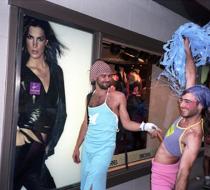Yomango Fashion Show 1 Favorite
"On July 5, 2002, a strange new brand began cropping up in the streets of Barcelona. That day, at the height of sales season, more than fifty people rushed through the center of Barcelona to the Bershka clothing store to perform the very first Yomango fashion show.
The show lived up to its “magical” billing: a simple object was turned into a symbol of another way of living. To be more precise, a ten-euro dress was spirited from the store, later to show up as a work of art at one of the most important art museums in the city. All the activities of Yomango were open, public and publicized.
The name “Yomango” and the lifestyle it celebrates refers to mangar, a Spanish slang term meaning “to shoplift,” particularly from multinational corporations. The concept of ethical shoplifting had suddenly acquired public visibility.
The Yomango brand is itself a reappropriation, or détournement, of the wildly popular Mango brand see TACTIC: Détournement/Culture jamming. By adding a pronominal prefix (yo, or “I” in Spanish) to the clothing company’s name, the modified brand takes on a different meaning entirely: I swipe. Yomango disrupts the primary goal of the original brand, turning it into a new direct-action practice based on the widespread habit of shoplifting.
At first glance, this may seem like a simple surrender to the greedy logic of capitalism, but nothing could be further from the truth. As Yomango states on its website, its only interest in commodities is “to make something new happen in their midst, to push them to the point of turning them into something else, something that has nothing to do with producing a way of life that is dedicated to consumption, but rather moves toward inventing new possible ways of living.”
Through its actions and its philosophy, but also through its style and design, Yomango turns the impulse to shoplift into a movement, a method, an art. For instance, Yomango introduced designs that were not only cool, but also served as gear for shoplifting, such as a “jacket of a thousand pockets,” in which all the many pockets were interconnected. When an object is surreptitiously placed in the jacket, it simply disappears, only to be discovered again sometime later, perhaps in the safety of your own home.
Thanks to a proliferation of workshops in arts institutions and social organizations in cities around the world, Yomango’s actions have expanded since the anti-brand first debuted. The website — built on an open-publishing framework enabling people to exchange information and experiences with anyone else captivated by the Yomango brand — also contributed to its spread. Various Yomango communities began appearing in different parts of the world: Argentina, Chile, Mexico, Germany, Italy, as well as other Spanish cities including Madrid and Bilbao.
Though it celebrates individual acts of self-liberation, the Yomango brand also gestures toward mass political action, with actions targeting various multinational corporations, such as the “Yomango-Tango,” in which a crowd of Yomango dancers in Argentina liberated hundreds of bottles of Champagne from a Carrefour supermarket, and then uncorked and drank them in a branch of Banco Santander — both entities directly implicated in the Argentinian economic crisis.
These actions have served as brand advertisements as enticing as the glittering billboards in the heart of the metropolis. In this way, the Yomango brand spreads through direct-action events and highly diverse avenues of communication: from the alternative media to the official press, from supermarkets to activist meetings, and from art catalogs to the Internet. The anti-brand is designed so that any person or group can reappropriate it in whatever manner he/she/it chooses, transforming it, plagiarizing it, elaborating on it.
Yomango. You want it? You got it!
Why it worked
Before Yomango, shoplifting was a clandestine practice. Yomango’s actions, designs, and advertisements made the action visible, celebrating it as a way of life. Yomango worked both on a personal level by offering practical tools to liberate products from the multinationals, and on a collective level by creating an international community united by collective actions and workshops."







